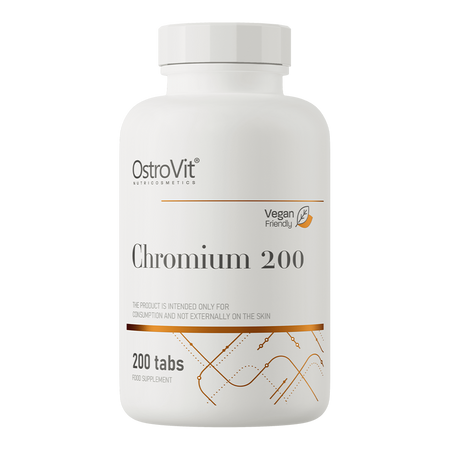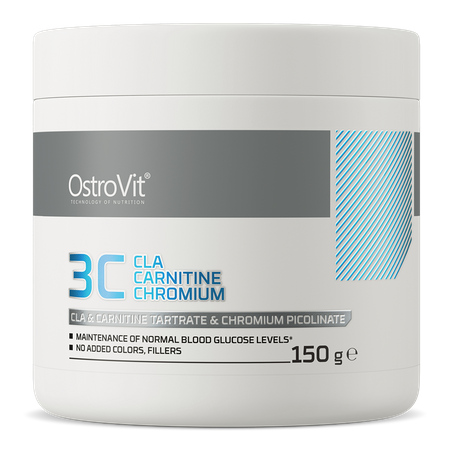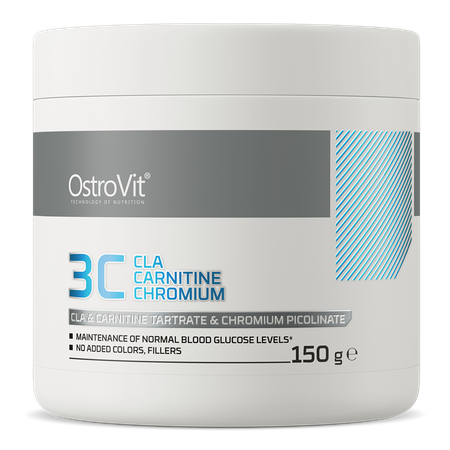Chromium
Chromium is a microelement, called a trace element. The human body does not need much of it to work properly, but chromium has many important functions in the body.
The element can take care of the appropriate concentration of insulin and glucose in blood, and can also affect the metabolism of carbohydrates, proteins and fats. In addition, it can have a positive effect on our immune system and reduce cravings for sweets.
Although little is said about it, it can be of great importance in the diet of athletes and slimming people.
Chromium - what is it?
Chromium is a trace element from the family of metals, belonging to the group of microelements. Its name derives from the Greek word "chroma", which means color. This is due to the fact that chrome takes on different colors depending on the form.
For the human body, the most important is chromium at the third oxidation stage.
Although you do not need much of it in the body, it is necessary for the proper functioning of the body and maintaining full health.
Sources of chromium in food
Chromium is an element that occurs naturally in food. Food products rich in this ingredient include:
- wholegrain cereal products,
- yeast,
- eggs,
- meat (especially poultry),
- fish and seafood,
- broccoli,
- peas,
- tomatoes,
- walnuts.
Chromium properties
Chromium is involved in many metabolic processes. The element can participate in the metabolism of carbohydrates and proteins. It can also be a component of many digestive enzymes.
Chromium can enable the synthesis of fatty acids and take care of the appropriate concentration of cholesterol, and thus the appropriate supply of the element may reduce the risk of atherosclerosis.
In addition, the compound may affect the activities of the pancreas associated with the production of insulin, i.e. peptide hormone responsible, among others, for the transport of glucose from the blood to the body's cells. When the proper functioning of the pancreas is disturbed and too little insulin is secreted, excessive accumulation of glucose in the blood may occur, and thus diabetes may develop. It can therefore be concluded that an adequate supply of chromium to some extent reduces the risk of this metabolic disease.
In addition, chromium can affect blood coagulation processes, DNA and RNA biosynthesis. The element can also support the body's immunity and participate in antioxidant processes.
Chromium can also promote glycogen storage and increase the use of glucose by muscles, and thus can stimulate the growth of muscle mass. In addition, the element can positively affect metabolic processes and may inhibit the action of catabolic enzymes.
Although it does not have slimming properties in itself, its adequate supply can positively affect the level of glucose in blood, and thus may reduce the risk of rapid fluctuations in sugar levels, which increase the desire for sweets. It can therefore be concluded that the appropriate supply of chromium supports slimming, because it can reduce the appetite for sweets.
Demand for chromium
For healthy women, the need for chromium at the level of sufficient intake (AI) is 25 ug per day, while among men - 35 ug.
Doses of up to 200 ug per day are assumed to be a safe supply of the element.
It is worth noting that the demand for chromium increases with age.
Chromium deficiency in body
Chromium deficiency in body may result from the use of an inadequate, poorly balanced diet low in animal protein and rich in simple sugars. Deficiencies of the element are also favored by a menu full of highly processed products.
Insufficient levels of chromium in body can also be affected by stress, injuries, intense physical exertion, fatigue and infections.
Also during pregnancy and lactation or during the use of a high-carbohydrate diet, deficiencies of the element can be observed.
Chromium deficiency can manifest as.:
- disorders of insulin metabolism,
- hyperinsulinaemia,
- insulin resistance,
- decreased glucose tolerance,
- deterioration of hair and skin condition,
- malaise,
- headache,
- irritability,
- the need to reach for sweets.
Long-term chromium deficiencies may contribute to lipid disorders, neurological abnormalities, growth disorders and increased risk of cardiovascular diseases, e.g. atherosclerosis, as well as diabetes.
Excess chromium in body
A healthy and balanced diet does not carry the risk of excessive supply of chromium. Excess of the element in body may occur as a result of incorrect supplementation.
Excess chromium can be toxic to the human body and can lead to skin and organ changes, such as kidney, liver or lung damage.
Excessive supply of chromium may also contribute to a decrease in the absorption of other elements, e.g. iron, as well as to the deterioration of pancreatic function and impaired proper insulin secretion.
Chromium absorption
It is worth remembering that there are substances and compounds that increase or decrease the absorption of elements, i.a. chromium.
Vitamin C, as well as glycine and vitamin B3 may contribute to increasing the bioavailability of the compound.
In turn, a decrease in the absorption of chromium can be observed by taking it in the company of phytates, simple sugars, zinc and iron.
Chromium supplementation
Taking dietary supplements rich in chromium can be considered by athletes and active people, among whom increased excretion can be observed, and thus a greater demand for this ingredient.
In addition, preparations with chromium can be used by people on a high-carbohydrate diet and exposed to stress and intense physical effort. Chromium is also popular among people on reduction diets, because it can reduce the appetite for sweets.
In addition, chromium supplementation should be considered by people suffering from deficiency of this element. An interesting issue also seems to be the possible beneficial effect of chromium on women with polycystic ovary syndrome.




